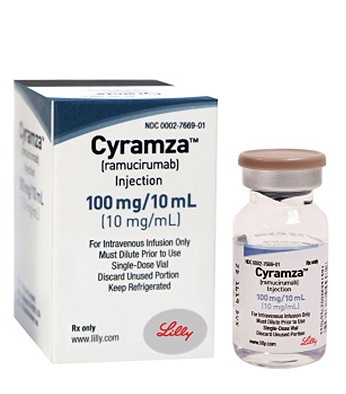Eli Lilly and Company said it expects to get insurance coverage for its stomach cancer drug Cyramza (ingredient: ramucirumab) in Korea by May, having received a favorable review from the health regulator’s benefits assessment panel.

The Pharmaceutical Benefits Evaluation Committee of the national health insurance agency in January said it recognized the appropriateness of granting reimbursement for the stomach cancer drug as a combination treatment with paclitaxel.
The positive opinion from the committee signals the likelihood of the Health Insurance Review and Assessment Service giving Lilly Korea the final okay for reimbursing Cyramza.
Eli Lilly and Company will soon negotiate with HIRA in the final stage of the reimbursement process.
“Because the last step of the negotiation phase with HIRA remains, we will work diligently at negotiations and do our best so more advanced gastric cancer patients in Korea can benefit from the improved treatment benefits quickly,” the company said in a statement.
The Korean branch of Eli Lilly and Company said it expects to get Cyramza reimbursement within three months. Regulations on the negotiation process dictate that the process finishes within four.
The committee’s favorable review comes within three years of drug approval in the country. The Ministry of Food and Drug Safety approved Cyramza in April 2015 as a single or combination treatment with paclitaxel for patients with advanced gastric adenocarcinoma whose disease progressed or metastasized on or after fluoropyrimidine- or platinum-containing chemotherapy. The drug comes in both 100 mg and 500 mg doses.
“We are very pleased to get the acknowledgement of reimbursement appropriateness in combination with paclitaxel from the HIRA’s evaluation committee at the end of January, having proved the survival benefits as a second-line treatment of advanced stomach cancer, which has a high unmet and critical demand,” the company said.
Positive results from a phase 3 RAINFALL study showed the drug to improve progression-free survival (PFS) as a first-line treatment of patients with HER2-negative metastatic gastric or gastroesophageal junction adenocarcinoma. But the drug does not improve overall survival, data showed.
In the U.S., one Cyramza dose costs $7,456, and the median duration of therapy lasted 19 weeks, according to Medscape. The U.S. Food and Drug Administration has approved the drug to treat certain non-small cell lung cancer patients, gastric cancer patients, and colorectal cancer patients.

